Nepal's rhinos on road to recovery with cross-country move
A successful anti-poaching and conservation initiative has seen the rhino population steadily climb over past decade
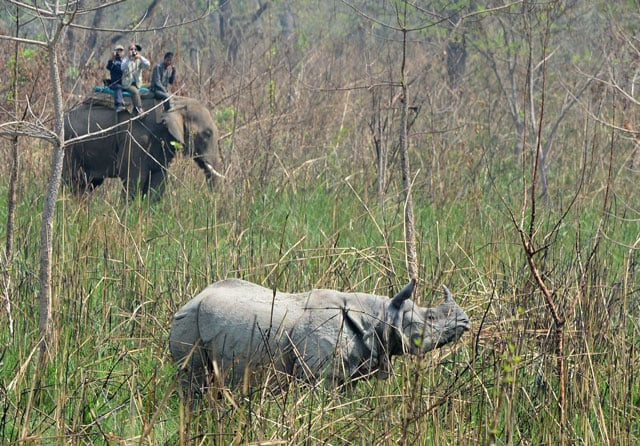
This file photo taken on April 3, 2017 shows a Nepalese veterinary and technical team preparing to dart a rhino in Chitwan National Park, some 250 kms south of Kathmandu. PHOTO: AFP
The cantankerous male -- whose single horn keeps him in the crosshairs of wildlife poachers -- is the first to be relocated to Shuklaphanta National Park but will be joined by four females of breeding age. Finding suitable rhinos for the ambitious relocation program is a marathon effort for the 100-strong team.
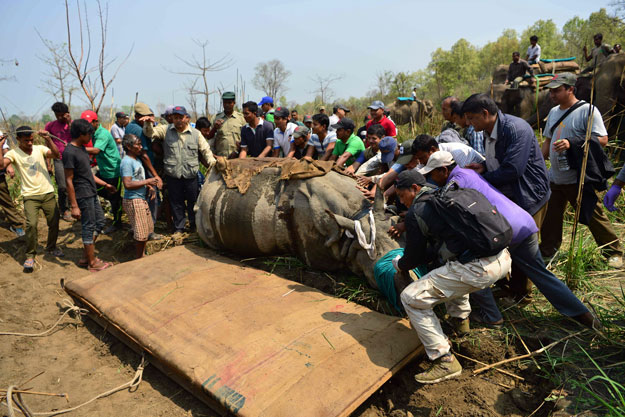 This file photo taken on April 3, 2017 shows a Nepalese veterinary and technical team prepare a sedated rhino before it is relocated in Chitwan National Park, some 250 kms south of Kathmandu. PHOTO: AFP
This file photo taken on April 3, 2017 shows a Nepalese veterinary and technical team prepare a sedated rhino before it is relocated in Chitwan National Park, some 250 kms south of Kathmandu. PHOTO: AFPAtop elephants they set off at dawn in Chitwan National Park, communicating in brief shouts and hand signals as they fan out across the plain and into the dense jungle. Thousands of one-horned rhinos once roamed the southern plains of Nepal but rampant poaching and pressures of human encroachment reduced their numbers to around 100 in the later part of last century.
A successful anti-poaching and conservation initiative has seen the population steadily climb over the past decade to around 645. But new blood was needed in Shuklaphanta National Park, currently home to about eight rhinos, to protect the country's population against threats, said Dr Kanchan Thapa, a biologist from conservation group WWF.
Poachers kill rare one-horned rhino in Nepal
A young female is the first rhino spotted -- a prime candidate -- but as she emerges from the dense bush, a young calf of about nine months follows her out. Her calf -- which will stay with its mother until it is around two years old -- counts her out of the move. The search continues.
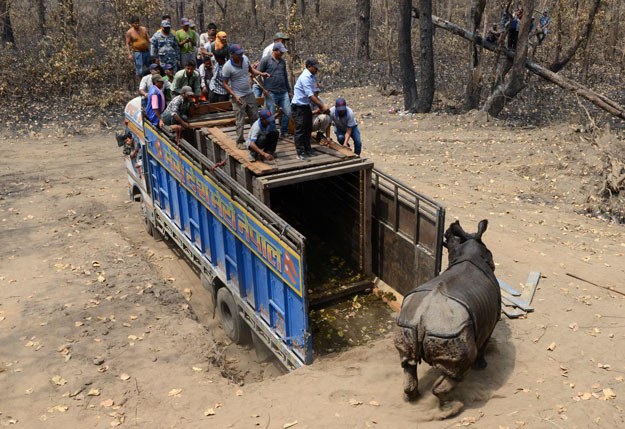 This photo taken on April 4, 2017 shows a Nepalese veterinary and technical team releasing a rhino after it was relocated to Shuklaphanta National Park, some 510 kms from Kathmandu. PHOTO: AFP
This photo taken on April 4, 2017 shows a Nepalese veterinary and technical team releasing a rhino after it was relocated to Shuklaphanta National Park, some 510 kms from Kathmandu. PHOTO: AFPMore than three hours later, an excited whisper goes around as another rhino is spotted: a huge male. The elephants encircle it, slowly encouraging him towards a marksman waiting perched in a tree with a tranquilizer dart gun.
It is a painstaking process: one wrong move could startle the 2-tonne male into charging the elephants or slipping back into the forest. He moves slowly towards the open plain where the marksman waits, almost veering out of range before coming to a stop within striking distance.
The dart hits the rhino in its flank. It breaks into a run but his lumbering strides gradually slow until he falls to his knees about 100 metres away. The vets attach a satellite collar around his neck and take blood samples before a dozen men roll him onto a sledge.
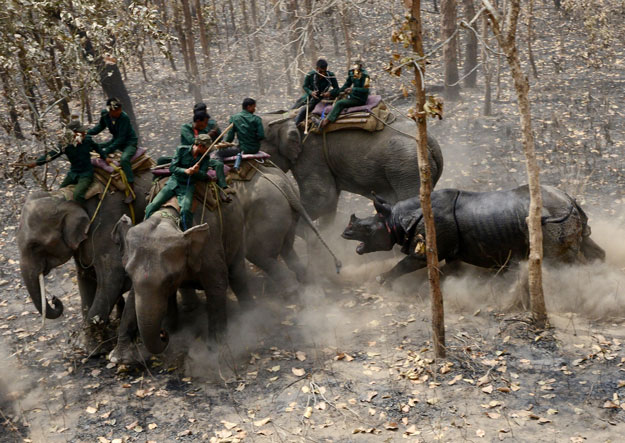 This file photo taken on April 4, 2017 shows a relocated rhino charging a Nepalese forestry and technical team after being released as part of a relocation project in Shuklaphanta National Park, some 510 kms from Kathmandu. PHOTO: AFP
This file photo taken on April 4, 2017 shows a relocated rhino charging a Nepalese forestry and technical team after being released as part of a relocation project in Shuklaphanta National Park, some 510 kms from Kathmandu. PHOTO: AFPA tractor is needed to shift him into a crate before the convoy begins a 15-hour overnight journey to his new home. It is midmorning by the time the truck reaches Shuklaphanta National Park in the far southwestern corner of Nepal.
Anticipation builds as the crate is opened, revealing the vast backside of a sleeping rhino. Despite the long journey, he initially appears reluctant to budge. But lumbering out of the crate, he suddenly springs to life and charges the truck, butting it a few times with his horn before turning his attention to three elephants standing nearby.
Ploughing headlong into the trio, the rhino leaves a deep gash on the backside of one elephant, panicking the beasts as the mahouts on top try to regain calm. The rhino stormed into the forest and out of sight, leaving a cloud of dust in its wake.
Onlookers cheer abuse of captive rhino at Lal Suharna National Park
The arduous -- and often unpredictable -- task of relocating these rare animals will be replicated at least 30 times over the next few years, as the government repopulates Shuklaphanta and another reserve in Bardia with new rhinos.
The growing population of greater one-horned rhinos -- found only in Nepal and India -- prompted the International Union for Conservation of Nature to remove the species from its endangered list in 2008. But the illegal trade of rhino horns, which are prized in China and Southeast Asia for their supposed medicinal properties, remains a real threat.
Only three rhinos have been killed by poachers in Nepal in the last four years -- the most recent on Saturday. But poachers would quickly return if vigilance dropped, said 72-year-old Gam Bahdhur Tamang, a retired member of Nepal's first rhino protection patrol set up by the then-king in 1959.
He spent 31 years patrolling the plains of Chitwan and says he caught around 25 poachers himself. Still today, he prays everyday for the safety of his flock. "When a rhino dies I feel it like it was my father."


1611687109-0/image-(3)1611687109-0-208x130.webp)



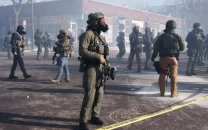












COMMENTS
Comments are moderated and generally will be posted if they are on-topic and not abusive.
For more information, please see our Comments FAQ